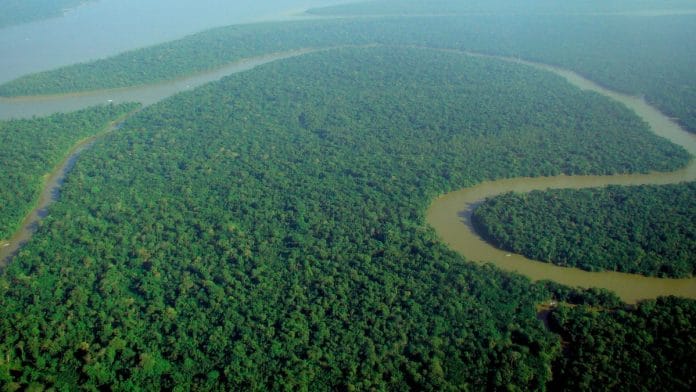Eight per cent of Amazon rainforest razed due to deforestation
A new study has found that deforestation in the Amazon has destroyed eight per cent of the world’s largest rainforest, between 2000 and 2018.
The Amazon rainforest is believed to play a vital role in curbing climate change, but in the recent years, destruction of this green belt has increased.
Deforestation hit a high of 49,240 square kilometres of forest loss in 2003, which was a record for this century. But then it eased to a low of 17,674 sq km in 2010. Since then, however, deforestation has surged, with annual area lost tripling between 2015 and 2018.
The Amazon is often referred to as the ‘lungs of the planet’ as it represents over half of the earth’s remaining rainforests. It is home to 16,000 plant species, with an estimated 390 billion individual trees. The region is also home to about 2.5 million insect species, and some 2,000 birds and mammals.
More about it on Aljazeera.
Also read: The Amazon is burning in 2020 again. It can just lead to more pandemics
Israel plans another Moon landing mission
An Israeli nonprofit called SpaceIL — whose spacecraft had crashed on the Moon last year — has announced its plans to launch another lunar mission in partnership with the country’s government. Called the Beresheet 2 project, the mission will include sending two landers and one orbiter to the Moon.
Its spacecraft had crashed months before India’s indigenously-developed Moon lander failed to make a landing. SpaceIL’s earlier craft represented the first privately-initiated Moon mission. Though the lander crashed, it is still the first non-governmental mission to touch the Moon’s surface.
In addition to Israel Aerospace Industries, the country’s science ministry and its national space agency will be partners in this new project.
Read more about it on The Washington Times.
Brine lakes on Mars may not have lasted more than 12 hours
A new study has pointed out that brine lakes on the surface of Mars may not have existed for more than 12 hours at a time. Brines are mixtures of water and salt that are more resistant to boiling, freezing and evaporation than pure water.
Existence of brines is a strong indicator of the presence of life. Researchers have combined data on brine evaporation rates, which were collected through experiments at a Mars simulation chamber.
Unlike in the past studies, the scientists had now taken into account all major phase changes of liquid, such as freezing, boiling and evaporation.
The study found that even in the best case scenario, brines could exist for up to 12 hours per day only.
More on the CNBC.
Human-made materials outweigh all life on Earth
A study has found that for the first time in history, human-made materials outweigh all forms of life on this planet.
The research showed that the weight of roads, buildings and other manufactured materials has been doubling, roughly every 20 years. At present, human-made materials weigh 1.1 trillion tonnes.
Meanwhile, the weight of living biomass, that include trees, plants and animals, has halved since the agricultural revolution. Living biomass weighs 1 trillion tonne currently.
The researchers said that 2020 likely marked the moment when human-made mass crossed over the tipping point. At the current growth rate, human-made material is likely to weigh as much as three teratonnes by 2040.
More on the National Geographic.
Also read: Human-made materials now weigh as much as all living biomass, say scientists






